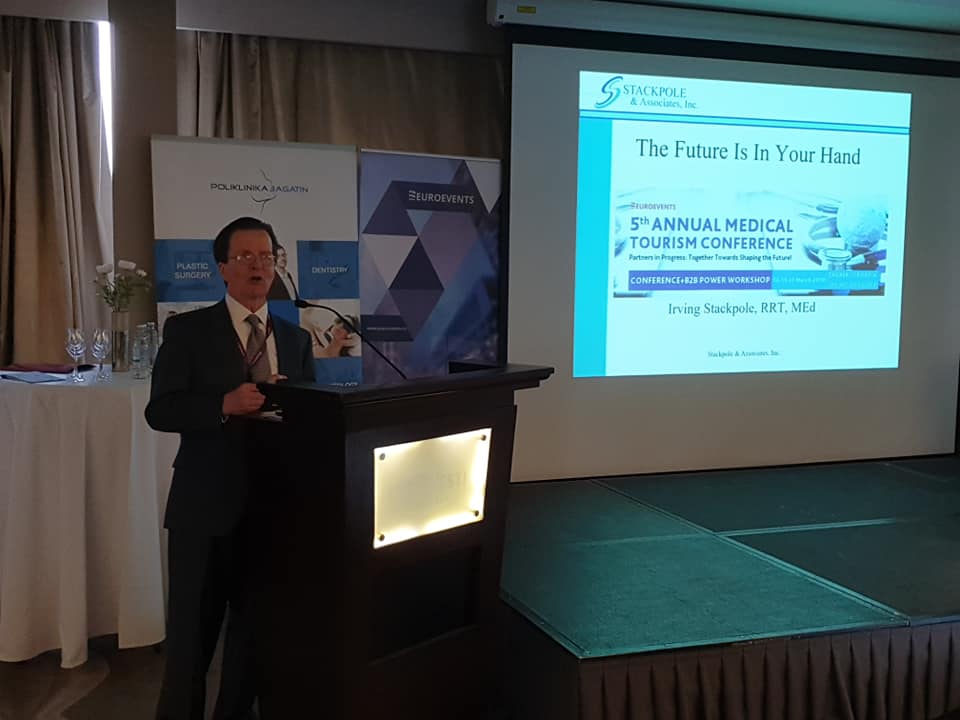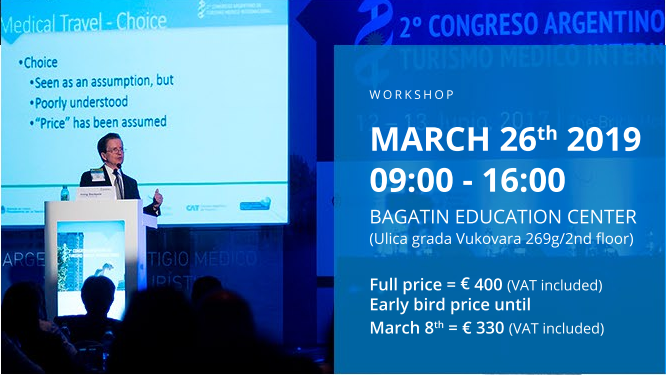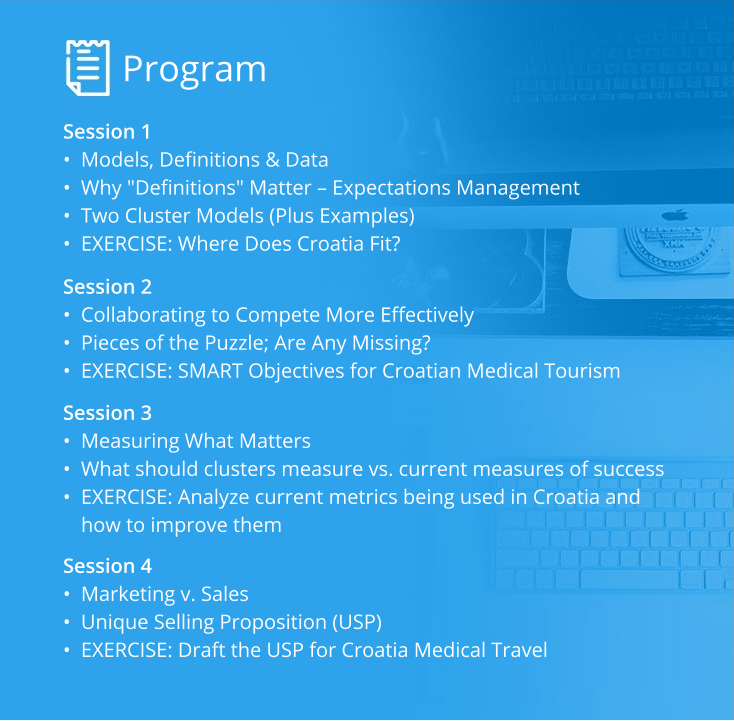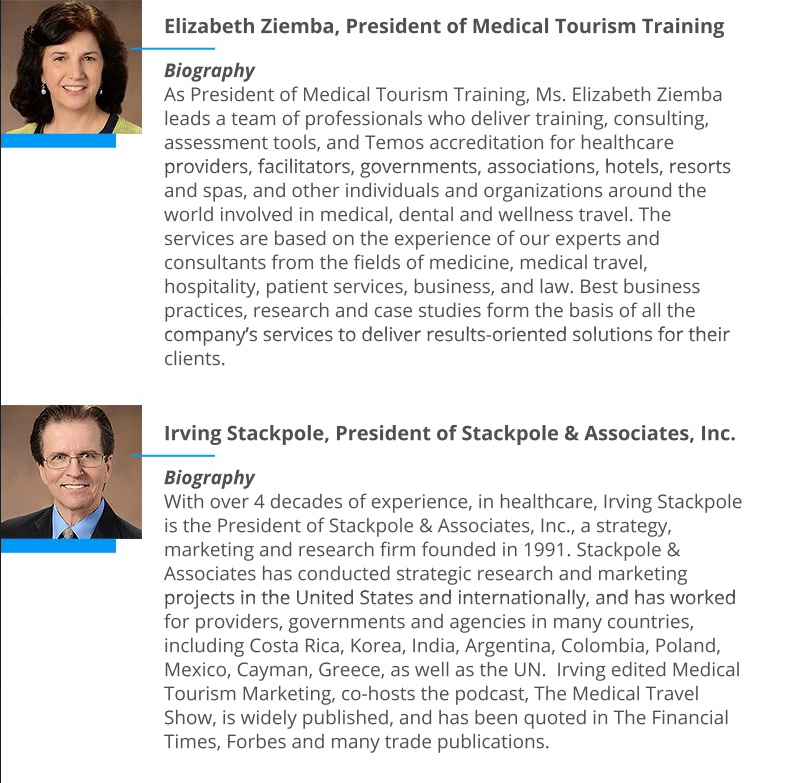March 18, 2019 - More international medical tourism expertise is heading to Zagreb to help grow the Croatian medical tourism story, as Irving Stackpole and Elizabeth Ziemba host a boutique seminar at Bagatin Education Centre in Zagreb next week.
The number of international medical tourism experts passing through Croatia these days is really quite incredible.
Although covering the health tourism industry is only a small part of what I do, it seems that every time I look at it, there is another global expert in town. I got to meet and interview Joe Sweet, International Patient Experience Director for the world-renowned Cleveland Clinic last week. Sweet was one of 22 international speakers at the 5th Annual Medical Tourism Conference in Zagreb, speakers which also included Irving Stackpole and Elizabeth Ziemba. You can read more about the conference here.
I had already been in touch with Stackpole and Ziemba by means of an email interview ahead of their next visit to Zagreb, on March 26.
While there are numerous conferences in the field of medical tourism in Croatia, there is even more happening in the background, with the Bagatin Education Centre in Zagreb holding a range of events. This is where I met medical tourism branding guru Ilan Geva at a recent workshop, and where Stackpole and Ziemba will be hosting a workshop on Taking Cluster Development to the Next Level: Changing the Course of Medical Travel.
1. It is great that you are coming to Croatia to share your expertise with local stakeholders. Tell us how the trip came about and anything else you will be doing while here.
IRVING: While we met Ognjen Bagatin years ago, it was at the World Health Care Congress in Washington DC in 2018 when we had an opportunity to discuss with him in detail the evolution of the health tourism markets in Croatia. Developing a workshop in Croatia came from that conversation.

2. You come at a time when the Croatian medical tourism industry is starting to get organised. The recent Health Spot Croatia conference included all the major stakeholders. How would you assess the current state of the medical tourism industry here, and what is the potential?
IRVING: Only having been to Croatia one time, to Opatia, it would be difficult to draw conclusions from that experience. From what we understand so far, there is ambition and high level of interest; these are always good initial ingredients to success!
ELIZABETH: Having just returned from a two-day conference in Zagreb, we have gained a bit more insight into the status of the health and medical tourism sectors in Croatia. While we have much more to learn and explore, it is clear that many key players are interested, engaged, willing to work hard and learn about the opportunities and obstacles.

3. What do you see are the competitive advantages that Croatia has in the global market?
IRVING: From what we understand, there is a high level of proficiency among the health and medical professionals in the country. And apparently the private healthcare infrastructure is also very advanced although we have not as yet had an opportunity to experience this firsthand. Quality of the healthcare services is of course paramount.
ELIZABETH: The country has a solid base of tourists upon which to build and enhance the overall reputation and brand of the country. It has made some progress in terms of the availability and quality of dental and cosmetic services so that with good leadership and cooperation from the clusters, valuable lessons can be learned from what has been achieved to date as well as guidance for what can be expanded and improved in the future.
4. You have vast international experience in medical travel and have both travelled the world. As Croatia takes its first small steps in the industry, which countries should it be looking to learn from, and why?
IRVING: While there are easy comparisons between countries such as Costa Rica, the hard-learned errors of every country or region can be useful to Croatia. It is essential that Croatia develop its own „unique sales proposition“ based on its assets and differentiators. We will be focusing on this in our workshop.
ELIZABETH: Costa Rica is a good example because it is of similar size in population and geographically as Croatia. Plus both countries have access to close markets in other countries – the US and Canada for Costa Rica and Italy, Slovenia, and other neighboring countries for Croatia. Costa Rica has an interesting leadership model that has good lessons to share with Croatia.

5. Your workshop theme is taking cluster development to the next level. Croatian health tourism has several clusters - Kvarner, Zagreb and Pannonia for example - but it is struggling to develop a national brand, which is surely the priority. How do clusters work together to strengthen the national brand while developing their own?
IRVING: In our workshop, we will focus on what a cluster is and what it is not. All of the organizations calling themselves „clusters“ are probably not clusters but are types of marketing collaborations. The functions of successful clusters, such as competition, monitoring and measurement will be emphasized. And regarding the national brand of Croatia, it is unlikely that medical tourism will define this for the country. Rather, understanding the attraction of Croatia in the travel and tourism markets, the extraordinary loyalty of the diaspora and the underlying assets of the country – these will provide an opportunity to leverage a medical tourism brand for Croatia.
ELIZABETH: This is an excellent question which we will answer during our workshop. The magic formula depends on strong leadership, a clear vision for the country's national brand, the ability to collaborate and compete while maintaining a unique selling proposition. Each of these components requires hard work.

6. Where do you see Croatian health tourism in 10 years, and what needs to happen to get it there?
IRVING: We certainly don't have a crystal ball! There are 1000 small steps that can be taken to improve the markets for health tourism to Croatia. Based on the energy and commitment we have witnessed, it's clear that Croatia will take 1001.
ELIZABETH: We would be happy to be hired to create a health tourism strategic plan for the country. Both Irving and I have experience creating strategic plans, marketing plans, and other road maps for countries, regions, and cities. It is a complex process that requires research and knowledge.
7. For those thinking of attending the workshop, explain what attendees will take home from a day with you.
IRVING: First and foremost, a clear eye and sober look at the international health tourism markets as they relate to Croatia. Second a structured approach to the evolution of a cluster in Croatia which will further the goal of developing Croatia as a premier health tourism destination. Finally, the skills needed to create a unique sales proposition at the clinic or national level, which will improve your competitive position.
ELIZABETH: Whether members of a cluster, government representative, or healthcare provider, participants will learn more about how clusters do or do not function; how to collaborate and compete within clusters; as well as to have the tools to create a unique selling proposition for the country and their organizations.
For more information about the seminar and to reserve a place, contact Bagatin Clinic.
To follow the momentum of the Croatian medical tourism story, follow the dedicated TCN page.


